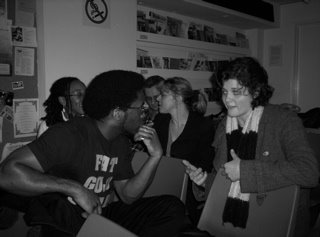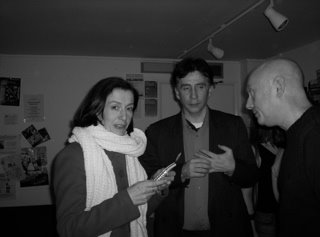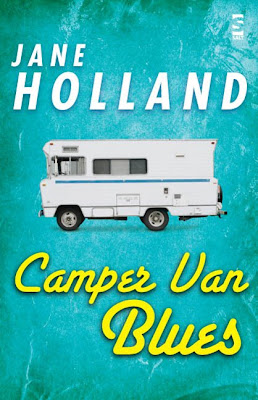So a funny thing happened to me at the TS Eliot readings last night, in London's magnificent Royal Festival Hall.
I was in the bar after the readings, chewing the fat with various poetry practitioners, when a woman leapt up to me and announced that she went to junior school with me - 33 years ago!
When I had recovered from my astonishment, I discovered that we had apparently been planning to write a novel together - just before I was removed from the school, and indeed mainland Britain, and sent off to school in the Isle of Man.
What was truly astonishing was her ability to recognise me after all these years. My memories of junior school are so dim and far-off (probably because I moved away) that I can't even recall teachers' names, though I remember the school itself. Have I changed so little since I was ten years old? What a frightening - and perhaps also comforting - thought.
But to the poetry!
I was in a box - not because I'm insufferably posh; it was all I could get at the last minute - and could see poet and editor Tom Chivers in a box opposite me, live-tweeting for the Poetry Book Society all through the proceedings.
The line-up was as follows: Simon Armitage, John Haynes, Brian Turner, Robin Robertson, Pascale Petit, Fiona Sampson, Sam Willetts, Annie Freud, Seamus Heaney and Derek Walcott (who couldn't be there, so Daljit Nagra read for him).
All the shortlisted titles can be bought via the
Poetry Book Society website.
Setting my stall out right away, Simon Armitage is my personal favourite to win this year's prize. There's often a perception about Armitage that he's too 'popular' to be taken seriously, and indeed one accusation being levelled at this particular book -
Seeing Stars - is that it's composed of fragments or anecdotes or prose poems, not straightforward poetry. I was delighted with his poem about a sperm-whale, loved his delivery, and think Simon opened the evening's proceedings with great aplomb and a vast, almost casual talent. I don't think he'll win this year, but I'd love to see him do it all the same. Go, Simon!
John Haynes surprised me. I'd expected him to be a much younger man, for some unknown reason, but he's not. He has a shock of white hair and a somewhat tremulous way of speaking his (formal) verse from his new book
You, and although I wasn't desperately enamoured of the long poem he read, he impressed me with an obviously warm, engaging and honest personality.
Former US soldier Brian Turner made me want to throw something at him. I restrained myself admirably, of course, but gosh, I was seething by the time he had finished. He came on stage and read a long, detailed, list-style poem from the point of view of hundreds of deeply unfortunate civilians in Iraq - as they fell to their deaths from a bridge during the war: men, women, free-falling children, a heavily pregnant woman whose child 'will never have a name' - or words to that effect. It was highly manipulative and sanctimonious in tone. I found this review quotation from John Bradley online:
'Brian Turner, a veteran of the
Iraq war, continues this tradition of using
poetry to inform and educate.' To educate is the key phrase there. It was highly disturbing to listen to, and the worst kind of sensationalism - I seriously wanted to put my fingers in my ears at one point, when he began describing the broken bodies of dead children.
The people in my box defended him afterwards, citing a tradition of war poetry by soldiers. But those soldier-poets were, in general, writing from the point of view of
soldiers. Not from the point of view of horrifically dying civilians.
To be clear about this, his poem was NOT written like a news bulletin or factual report, which - in an ideal world - does not set out to treat subjects in a personal, emotive or intrusive way. His poem had the audacity and bad taste to enter at length into the mind of a young child falling to his death, a pregnant woman falling to her death, another helplessly watching her child free-fall beside her, and to capitalise on the power and horror of those
real experiences. To use them as a springboard for his writing. In those moments, being forced to listen to Brian Turner describe those unfortunate people's deaths in such minute detail, the word 'poem' died a little for me, and became nothing more than one more act of grubby sensationalism in a world of the self-seeking and the desensitised.
Robin Robertson. Well, what can I say? I love his luminous, tightly-worked lyrics, and in the past have often read them in order to find a path back into poetry when feeling lost. However, there's a sparingness about them that has always been a little problematic for me, a quality of under-speak. Like the poetry has been pared away to mere slivers of language by a master craftsman. And while that felt marvellous for me at one stage, looking to such lyricism to save me from a general lack of inspiration, I was waiting to see how Robertson had moved on from his last book, and his reading last night didn't particularly convince me that he had. His subject matter was unrelentingly grim too, even dour, and his poetry 'slivers' seemed to lack some essential spark which they once possessed for me. I thought the same about his book,
The Wrecking Light, when I bought it some months back, i.e. that it was a little too much like its predecessors. But he's probably still a strong contender to win this.
Pascale Petit is, of course, a poet of enormous power and imagination. I find her subject matter disturbing as well, but there is a sense of connection there, so strong and human as to be utterly understandable in her case. Some of her imagery is so startling and apposite, you almost wish to applaud it during the poem. I would certainly be happy to see her book
What the Water Gave Me win this year's prize.
The same applies to Fiona Sampson, whose new book
Rough Music seems to continue on from where
Common Prayer left off. She has a lyricism that falls delicately on the ear, so that her power lies largely in an accumulative effect. This may make her less of a candidate for the prize, which would be a shame, as there is much to be prized in Sampson's subtlety of approach, her musicality and an easy, natural talent for language and its nuances in poetry.
Sam Willetts was unknown to me before last night. I will now seek out his work -
New Light for the Old Dark. He can be a gently comic as well as a dark and elegiac poet, and although a win by Willetts would be a shock - this is his debut, after all - I would be perfectly able to see how the judges could come to such a decision. His work possesses both light and shade, subtlety and force, to a powerful and mature degree, and hints at greater things to come. A newcomer to watch!
Annie Freud - well, I already gave her book
The Mirabelles a big thumbs-up in the pages of the most recent Poetry Review, so I shall not discuss her at length. But she is another likely candidate for the prize this year. Her work is also mature, powerful, and - most importantly perhaps, as far as long-term success is concerned - is written with personality rather than a desire to be applauded. As compere and poet Ian McMillan mentioned in his introduction, Annie Freud writes what is most dear to her heart and ignores all other considerations. The fact that she couples this determination with a keen understanding of poetic form and structure makes her book another strong contender this year.
Seamus Heaney came on to huge applause, and was probably the most applauded poet of the night, in fact. It was clear from the audience reaction - apparently nearly 2000-strong in the vast arena - that this was the man many of them had come to hear. He looked and sounded a great deal older than when I last saw him read, at the Cheltenham Festival in - I think - 1995, just after he had won the Nobel Prize. But despite that, he was clearly the crowd's favourite by the end of the night. And his poems were sound as ever, always so perfectly formed and rounded. Good luck to him.
Derek Walcott's work was read - very engagingly too - by Daljit Nagra. Daljit threw a few jokes of his own in, but I'm sure Derek wouldn't have minded, and it certainly lightened the evening for the audience. The first sonnet he read was a corker, where the aged poet - in a wheelchair - meets an old flame - also wheelchair-bound - in an airport lounge, as I recall. By turns humorous, wry, despairing, lovesick, and full of the spark of poetic reinitiation, this was the second highlight poem of the evening for me, alongside Simon Armitage's sperm-whale.
Which is where I came in ...
The announcement of this year TS Eliot Prize winner will be made this evening in London.






